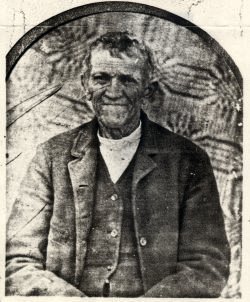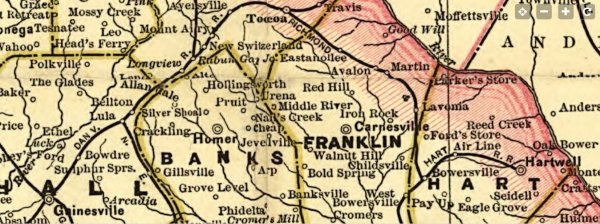|
The Jenkins Family LORENZO CLARK JENKINS
This family lived in Franklin County, Georgia, about 18 miles from the town of Toccoa, which is now in Stephens County (created in1910 from a portion of Franklin).
When Cornelia Davis Jenkins died sometime shortly after the birth of her third child, Lorenzo took his children to live with their grandparents, Thomas and Elizabeth Davis, in neighboring Pickens County, South Carolina-about thirty miles from the Jenkins home in Georgia. On February 3, 1859, the relatively young widower married for a second time. His new wife was Nancy Winney Ramsey, a twenty-six-year-old native of Georgia. At this time, Lorenzo brought his children home but young Ben and his sister Zobedia did not like their new stepmother and reportedly "took their mother's things" and ran away back to their grandparents, where they remained until after the Civil War was over. There is no record of whether Thomas Benjamin Jenkins joined them or if he remained at home with his father and stepmother. The Civil War and Reconstruction Years Owing to the fact that he was forty-four years old when the Civil War began in the spring of 1861, there seems little likelihood that Lorenzo C. Jenkins would have served in the Confederate army, yet he did so. On July 7, 1863 Lorenzo enlisted at Carnesville, Georgia (the seat of Franklin County) in the Fourth Battalion of Georgia State Guards as a private in Capt. Thomas A. Skelton's Company (identified as both Company C and Company D), "for local defence, to serve within the 6th and 9th Congressional Districts of Georgia." According a notation in his military service record, Skelton's company was "ordered into active service and pay commenced Sept. 19, 1863, to Jan. 31, 1864." They were "mustered out of service Feb. 17, 1864," by "order of Maj. Gen'l. Howell Cobb." It appears, however, that Lorenzo C. Jenkins' service record is incomplete because his later application for a state pension states that in May 1864, he enlisted in Company K of the Fourth Regiment of State Troops to serve for a period of ten months and that while he was at home on a thirty-day furlough in the spring of 1865, the war ended. A fellow Franklin County resident named T.M. Looney, who had served as a lieutenant in the same company, corroborated his claim, remarking also that Lorenzo had "made a good soldier." Although there were some Confederate soldiers as young as fourteen, there seems to be no record that Lorenzo's oldest son, Thomas, who was seventeen by war's end, ever enlisted in the service of the Confederacy. On September 11, 1865, in keeping with President Andrew Johnson's "Proclamation of Amnesty and Pardon for the Confederate States," Lorenzo C. Jenkins took an oath of loyalty to the United States, which read: "I, Lorenzo Jenkins, do solemnly swear (or affirm), in presence of Almighty God, that I will henceforth faithfully support, protect, and defend the Constitution of the United States, and the union of the States thereunder, and that I will, in like manner, abide by and faithfully support all laws and proclamations which have been made during the existing rebellion with reference to the emancipation of slaves. So help me God." On July 26, 1867, in order to meet the requirements of Congressional or "Radical" Reconstruction (and therefore, to regain the right to vote), Lorenzo signed a second oath of loyalty. which read:
Sometime between 1860 and 1870, Lorenzo's second wife, Nancy Ramsey Jenkins, died and he married for a third time. His third wife was Martha Ann Kelley. She and Lorenzo were probably wed sometime in 1866. Martha, a native of South Carolina, was born about 1830. Lorenzo C. Jenkins fathered at least six more children between 1860 and 1870. In all likelihood, his second wife, Nancy, was the mother of Newton Jenkins, born about 1863 and William H. Jenkins, born about 1865. There is no doubt that Lorenzo's third wife, Martha, was the mother of John M. Jenkins, born about 1867; Mary E. Jenkins, born about 1869, Samuel, born 1871, and Louis T., born 1875. Unfortunately, apart from the names of his wives and children, we know next to nothing about Lorenzo C. Jenkins' post-Civil War life beyond the fact that he was a poor farmer who resided in Franklin County, Georgia and struggled to eke out a living on a small piece of property that he almost certainly rented from a landowner on either a cash or shares basis. The 1870 federal agricultural census provides us with proof of the poverty of this family. It shows that during the previous 12 months, Lorenzo C. Jenkins farmed 40 acres of improved land, that the property on which he lived included 35 acres of woodland and 10 acres of "other unimproved land." This census also shows that the cash value of the property, on which he raised 150 bushels of Indian Corn and $10 worth of "orchard products" during the previous year was only $600 and that the value of his farm machinery and implements was $15. His livestock consisted of one milch cow and six swine, valued in total at $50. In addition to corn and fruit, he produced 300 pounds of butter. The value of the home manufactures of the Jenkins family was $25, the value of animals slaughtered was $90. The total value of all farm production was $200. All in all, a pretty poor showing for a year's work. An unsubstantiated family story holds that before the war Lorenzo was fairly well-to-do but that the devastation visited upon Georgia by General Sherman prompted Lorenzo to return to South Carolina for a while. A similar story holds that after the war he went to Illinois, then Texas (via Indian Territory) before returning to Georgia. As noted, these stories lack any evidence to back them up. It is a fact, however, that Lorenzo Jenkins was enumerated in the federal census of Franklin County, Georgia for 1850, 1860, 1870 and 1880 and that the value of his real estate in every case was never more than $1,000. He is not listed on the 1850 and 1860 slave schedules as a slave owner, which is not unusual. Contrary to popular belief, most white southerners were not slaveholders. The Land Mystery In light of the fact that there are no land transactions for Lorenzo C. Jenkins on file in the deed records of Franklin County, Georgia for any of the more than five decades that he resided there, apparently, he was not only not a slaveowner, but not a landowner either. Yet, there are other records that contradict this supposition. For a start, the 1860 federal census shows him owning real estate valued at $1,000. Likewise, the 1880 federal agricultural census shows us that he was not only struggling to make a living off the land-this time on only six acres of cultivated soil and fifty acres of woodland, and with only three cows-it also shows him as owner of the property he tilled. Franklin County tax rolls likewise show him as a landowner, In 1861, for example, he was taxed on 120 acres of third quality land and from 1878 to 1882, he owed tax on property that ranged in size from 5 to 30 acres. So, what's the story? There are two possible explanations: Either the census-taker made a mistake or Lorenzo failed to have any land transactions in which he was a buyer or seller entered into county records. Lorenzo Jenkins' Final Years Lorenzo's third wife, Martha, died sometime between 1880 and 1895, almost certainly in Franklin County. Unfortunately, we do not know where she or either one of his first two wives were buried. In 1895, at the age of seventy-nine, while living alone on a farm near the town of Avalon, Lorenzo C. Jenkins applied for an indigent pension from the State of Georgia, based on his Civil War service, the infirmities of old age, which purportedly included a hernia and heart trouble, and poverty. His taxable property, which included "a few hogs and a couple of beds," was valued at less than $40. In his application, Lorenzo said he lived on the little he obtained from his own labor, which amounted to about $40 or $50 a year, as well as help from friends. According to his own account, none of his six surviving children-five sons and one daughter-lived near him or provided him with any financial support. From all appearances, his application was approved, although the amount of the pension he afterward received is unknown. In 1897, probably because it was required by law, Lorenzo re-applied for his state pension, stating that his health had deteriorated further and that owing shortness of breath as well as a hernia and rheumatism, he was then unable to get about except with the aid of crutches. He made a similar statement on a subsequent application in 1898, which is the last on file. Due to the fact that he is not listed in the 1900 federal census for Georgia, it is a near certainty that he passed away sometime between 1898 and 1900. Although Lorenzo C. Jenkins' final resting place is presently unknown, there are two likely possibilities: Either the Confidence Cemetery in Toccoa, Stephens County, Georgia (which is near Avalon and north of Carnesville, the seat of Franklin County), or the Avalon City Cemetery. In all probability, one or more of his three wives are likewise buried in one or both of these cemeteries.
The Jenkins Family
This website copyright © 1996-2022 by Steven R. Butler, Ph.D. All rights reserved. |




